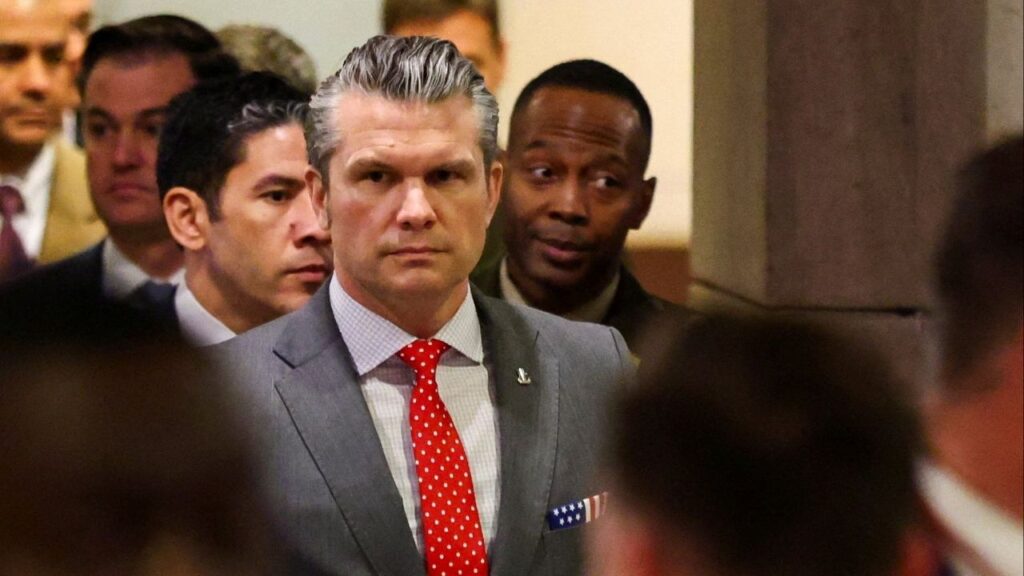Share
|
Getting your Trinity Audio player ready...
|
![]()
■Prop. 1 would float a $6.4 billion bond and redirect county behavioral health funds to provide care for homeless, including veterans.
■Opponents say Prop. 1 forces counties to do more with less.
■Many behavioral health professionals fear speaking out against the proposition.
Proposition 1 is the only statewide initiative to go before California voters on the March primary ballot.
Analysis
It has a $14 million campaign war chest, with Gov. Gavin Newsom championing a major reform to a two-decade fund dedicated to mental health in California.
But opposition to Prop. 1 appeared as soon as it began — back when it was two bills brought forth by California legislators.
Behind the scenes, associations of mental health nonprofits, agencies, and county officials worked with authors of Prop. 1 to minimize the “disaster” the changes in how counties spend money on mental health would bring about, said a mental health professional who requested anonymity.
In addition, Newsom’s grip on California politics and public funding is so strong that representatives of many nonprofits fear retaliation if they come out against the governor’s project to solve homelessness.
Reforms to the Mental Health Services Act move money away from counties to state agencies.
With just a $1,600 campaign fund, the No on Prop. 1 advocates hope to somehow convince voters about the negative impact that forced housing, less money for local mental health programs, and less local control will have on California’s mental health challenges.
Prop 1 Promises a Homelessness Fix by Diverting Mental Health Funds
The authors of Prop. 1 combined two initiatives to provide support for people with behavioral health illnesses.
The first asks voters to authorize a $6.4 billion bond to create mental health treatment facilities and money for housing programs. The second amends the 2004 MHSA approved by voters.
MHSA’s 1% state income tax on earners making more than $1 million a year has generated $29 billion from its inception through 2022, according to the LA Times.
The money was designed to supplement county budgets. Ninety-five percent of MHSA money goes to counties to fund mental health programs.
Prop. 1 narrows how counties can spend behavioral health money. It also mandates that 30% of MHSA funds be spent on “housing intervention.”
The MHSA reforms bolster California’s recent mandated care initiatives.
Senate Bill 1338 allows family members or first responders to petition courts to mandate involuntary treatment for mentally ill individuals. Senate Bill 43 increases powers and access to conservatorship.

Mayor Dyer Supports Prop 1
Fresno Mayor Jerry Dyer says Prop. 1 will help address the chronically homeless.

“We have a mental health crisis in our state and our country, and what we’re currently doing just isn’t working.” — Fresno Mayor Jerry Dyer
“Many of the folks that are out on the streets today have been chronically homeless, people that have been suffering from higher acuity levels of mental illness and people that may not be in a mental frame of mind to even accept services in housing,” Dyer said.
A study from UC San Francisco said 82% of homeless reported suffering from some form of mental illness at some point in their life. The number of inpatient mental health facilities has been on the decline for decades.
Prop. 1 proposes to create 11,000 mental health beds throughout the state.
“We have a mental health crisis in our state and our country, and what we’re currently doing just isn’t working,” Dyer said.
Prop 1 Shifts Funding From Youth to Housing Intervention
While Prop. 1 proponents hope funding will address chronic homelessness, opponents say changes take money away from county programs, especially those aimed toward children.
Prop. 1 focuses on helping veterans with substance abuse or behavioral health issues instead.
“Voting YES on Proposition 1 will ensure we honor our veterans every day, not just on this important occasion,” Newsom said in a news release. “Proposition 1 will prioritize getting people — including those that have served our nation — off of the streets, out of tents, and into the treatment they deserve.”
Prop. 1 allocates $1 billion “in critical funding for veterans.” But that $1 billion isn’t new money. Prop. 1 instead redirects money that counties now use for early intervention programs targeted toward children to keep behavioral health problems from getting worse.
For mental health professionals, quantifying the effect early intervention programs have is difficult. But the early intervention programs include children at the edge of homelessness, said one mental health professional. Many are children living in a shelter or unstable home.
The professional said using mental health funds to clean up homeless encampments creates problems further down the road.
Paul Simmons, the co-director of the No on Prop. 1 Campaign and the co-founder of the Depression and Bipolar Support Alliance in California, likens early intervention to treating cancer.
“If you detect and treat cancer at, you know, when it’s stage one, so to speak, the treatment may be expensive, but the prognosis is very good,” Simmons said. “If you wait until it’s stage four, it’s incredibly expensive and they’re toast anyway.”
Loss of Local Control Could Also Mean Loss of County Programs
Many county officials have not taken an official stance on Prop. 1, but they have been vocal about the changes the initiative would bring about.
To qualify for prevention and early intervention programs, one has to be diagnosed with a severe mental illness or serious emotional disturbance, according to Ahmadreza Bahrami, behavioral health & equity services manager with Fresno County.
Where a significant portion of MHSA money goes toward early intervention programs for children and youth, Prop. 1 drops funding amounts for those programs by outlining how counties must spend their funds.
Prop. 1 requires counties to spend 30% of MHSA funds on “housing intervention.” That means rent and deposits, Bahrami said.
“But not the cost of supportive services in our permanent supportive housing efforts,” Bahrami said.
The funds for children and youth early intervention would drop to 8% of the MHSA funds under Prop. 1.
“The passage of Prop. 1 would eliminate local control of funds for population-wide mental health prevention and related activities,” Bahrami said.
Programs including suicide prevention, stigma reduction, and navigation support may sunset in the next few years, Bahrami said.
Prop. 1 also places many substance abuse disorders beneath the behavioral health umbrella, but it doesn’t add funding.
“They’re going to take less money to do the same thing,” Simmons said. “They know they’re going to have to cut programs, they don’t know what they’re going to cut yet, but it’s typically going to be the smaller, you know, the community-based organizations.”
Prop 1 Redirects Money, Control to the State
Prop. 1 doubles the amount of money going to the state from MHSA from 5% to 10% of the millionaire’s tax. The nonpartisan Legislative Analyst’s Office estimates $140 million annually would be shifted from the counties to the state. Given the variable nature of the tax collected each year, that amount can vary.
The state would create a workforce initiative through the California Department of Healthcare Access and Information with 3% of MHSA funds, according to a study by the California State Association of Counties. The CSAC took no official stance on Prop. 1.
The state would take on the work of prevention programs — such as the Suicide Hotline — with 4% of MHSA funds, managed by the California Department of Public Health. Three percent of MHSA funds would go to state administration.
Much of the work — especially prevention programs — has been handled by counties, so the state will have to build out its infrastructure.
Prop. 1 also makes the MHSA oversight committee accountable to DHCS.
“From my perspective, they’re going to manage it by spreadsheets, it’s just all going to be numbers,” said Simmons. “And that’s what I’m talking about, you can’t just count numbers with mental health.”
$6.4 Billion Bond Creates a Variety of Grant Programs
The $6.38 billion bond pays for a variety of housing needs. This breakdown comes from the California State Association of Counties:
- $1.065 billion for loans or grants for veterans or their households who are homeless, chronically homeless or at risk of homelessness
- $922 million for loans or grants for people who are homeless (not necessarily a veteran) and have a behavioral health challenge
- $4.39 billion for a continuum of behavioral health treatment
- $1.5 billion to cities, counties, and tribal entities as grants under the Behavioral Health Continuum Infrastructure Program
- $2.89 billion for additional grants under BHCIP
- Additional grants administered by the California Department of Health Care Services to construct, acquire and rehabilitate real estate assets or to invest in needed infrastructure
The bond would cost $310 million per year for 30 years, according to the LAO.
The bond comes after voters have passed four other veteran housing programs.
Voter-approved Prop. 1 in 2018 provided $4 billion toward veteran housing programs. Voters also approved Prop 41., providing $600 million for veteran housing and homeless prevention. In 2008, voters approved Prop. 12, $900 million for the CalVet Home Loan Program. 2000’s Prop. 16 provided $500 million for veteran housing programs.
Who Paid for Prop 1 Campaigns?
Gov. Newsom is the biggest contributor to Prop. 1. The Newsom Ballot Measure Committee; Yes on Prop. 1 contributed $13.6 million.
Conversely, the No on Prop. 1 campaign has raised $1,600, Simmons says. They run the campaign with volunteers largely from the mental health services industry.
Many feel the state expects more from the counties without providing them with the necessary resources.
“Somebody in outpatient care with good services will do better than somebody in inpatient care without the good services, so we need their services first, and that’s exactly what we’re going to lose with Prop. 1,” Simmons said.




















